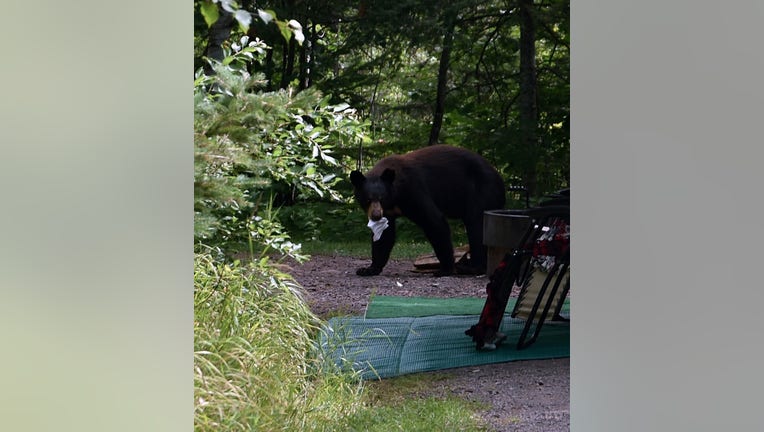DNR: Bear sightings on the rise in northern Minnesota due to natural food shortage

A Black Bear peruses a campsite at Tettegouche State Park at the beginning of August..
(FOX 9) - The DNR says bear-human contacts in northeastern and north-central Minnesota are increasing due to a shortage of natural foods.
According to a release, the DNR says Black Bears have been gravitating toward homes, cabins and campsites after dry conditions caused a food shortage.
“We’re asking people to remove food sources that could attract bears from their properties or campsites,” said Andrew Tri, a bear biologist for the Minnesota Department of Natural Resources. “It’s important that folks be extra vigilant in keeping trash and birdseed away from bears to ensure they don’t get an easy meal from what people leave out.”
The DNR pointed specifically to bird feeders, dumpsters and trash containers as what are attracting bears this summer.
Campers are also asked to stay vigilant, especially when they are camping remotely, by leaving no trace when packing up. Campers are asked to lock up food and trash, use bear-resistant containers or techniques and to carry bear spray and learn how to use it properly.
“If bears are in the area, let your neighbors, homeowners association or lake-owners association and fellow campers know about it so everybody keeps potential attractants away from bears,” Tri said. “Together, we can reduce conflicts with bears and avoid teaching them bad habits.”
The bears are typically shy and flee when encountered, but they are bolder when natural foods are in short supply.
People are asked not to try and pet bears or approach them. While injuries due to bears are rare, people should still be cautious.
The state of Minnesota does not have bear relocation program because rangers say it does not resolve the underlying issue, which is food sources left out by humans. Relocated bears often return or become a problem elsewhere if they are relocated.
Here is a full list of ways to avoid bear conflicts:
- Store garbage in bear-resistant garbage cans or dumpsters. Keep garbage inside a secure building (not a screened porch) until the morning of pickup.
- If there is not a secure building to put bear attractants in, erect an energized fence around trash or any other item attractive to bears (e.g., fruit trees, animal feed, gardens and compost piles).
- When camping, pack out trash, dispose of it properly, and store food in bear-resistant containers or in a locked vehicle or camper.
- Avoid feeding birds from April 1 to Nov. 15.
- If you still wish to feed birds, hang birdfeeders 10 feet up and 4 feet out from the nearest trees. Use a rope and pulley system to refill birdfeeders, and clean up spilled seeds daily.
- Do not leave food from barbeques and picnics outdoors, especially overnight. Standard coolers are not bear-proof, but there are lockable, bear-resistant models available.
- Pick fruit from your trees and collect any fallen fruit promptly. If not feasible to pick all the fruit, protect trees from damage by using an energized fence.
A plea to hunters: Don’t shoot research bears
Also Monday, the DNR sent out a request to bear hunters to not shoot bears with ear tags or radio collars.
Right now, the DNR is monitoring about 20 radio collared bears across the state. Most of them are in the Chippewa National Forest between Grand Rapids and Bigford. Others are near Voyageurs National Park or around Camp Ripley.
“We’re asking hunters to avoid shooting these valuable research bears. These collared bears give us much of the data we use in bear management,” said Dave Garshelis, DNR bear research scientist.
While the collars and tags might be difficult to see, the DNR is asking hunters to take a little extra time to try and spot those things before taking a bear. It is not explicitly illegal to take a research bear.
Any hunters who do shoot a collared bear should bring the collar to a bear registration station and call the DNR Wildlife Research Office in Grand Rapids at 218-328-8879 or 218-328-8874 to report shooting a collared bear.

